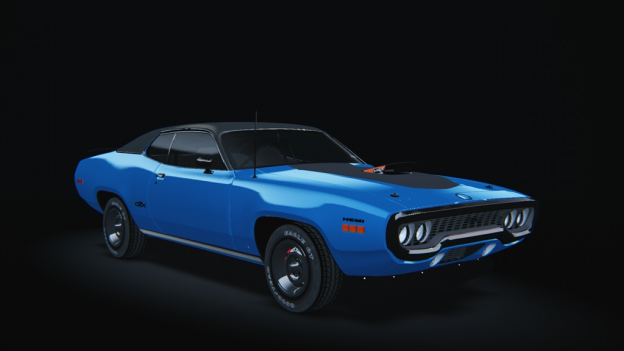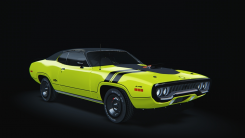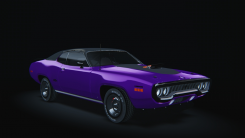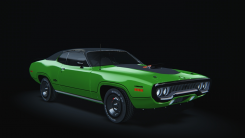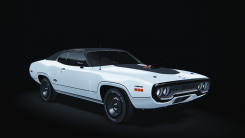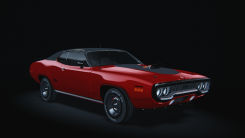Plymouth GTX - 1971 current version RC1.0
- Assetto-db rating
| Car version | RC1.0 |
|---|---|
| Brand |  Plymouth Plymouth |
| Class | vintage american |
| Power | 425 bhp @ 5000 RPM |
| Torque | 490Nm |
| Weight | 1605kg |
Introduced in 1967 as the Belvedere GTX by the Plymouth division of Chrysler. The Plymouth GTX was built to be a "gentleman's" muscle car and provided an exceptional blend of style and performance. Standard on the GTX was Plymouth's "Super Commando 440" V8 rated at 375 hp and a heavy duty suspension system. Buyers looking for more performance could also opt for legendary 426 cu in HEMI engine rated at 425 hp. The Plymouth GTX also looked the part with a special grill, mock hood scoops, chrome "pit stop" fuel filler cap and optional racing stripes. The GTX was produced from 1967 to 1971 as a stand-alone model, in 1972 the GTX became an option package on the Road Runner.
1971 was the big body style change (akin to Roadrunner and Charger), a continuation of the "fuselage" style; aircraft and space motivated, John E. Herlitzs groundbreaking styling featured swoopy lines, and large, looping bumper/grill assemblies. One of the more functional changes was the extension of the rear track by nearly three inches, increasing stability and improving cornering. Other changes included new interiors, sunroofs, flush door handles, ventless side glass, functional air-grabber hoods, and the famous Tuff steering wheels.
Inside the GTX, contour bucket seats became standard (they were optional on the Road Runner). The Tuff steering wheel was a mere 14.5 inches in diameter but a full inch thick. Rear spoilers were optional along with rear window louvers. Brakes remained the same size, but wheels expanded to 14 x 6, with optional 15 x 7 rims. The wheelbase was a little shorter, at 115 inches; length was 203.2, height 53.0, width 79.1, and maximum track 62 inches. The front torsion bar had a .92 inch diameter; the front stabilizer bar had a .88 inch diamter. In back, the left side leaf springs had five leaves and two half-leaves; the right side had six leaves.
The 440 put out 370 gross horsepower, 305 net, at 4,600 rpm; torque was 480 lb-ft at 3,200 gross, 400 net. The standard rear axle had an 8 3/4 inch ring gear diameter and a 3.23:1 ratio.
The GTX, now in its fourth and last year as a model rather than a trim level or option package, hit just 2,942 sales in the United States making the terrible 1970 GTX sales seem downright positive. In contrast, Duster continued to soar with over 185,000 sales, showing that price does matter, at least for value brands.
